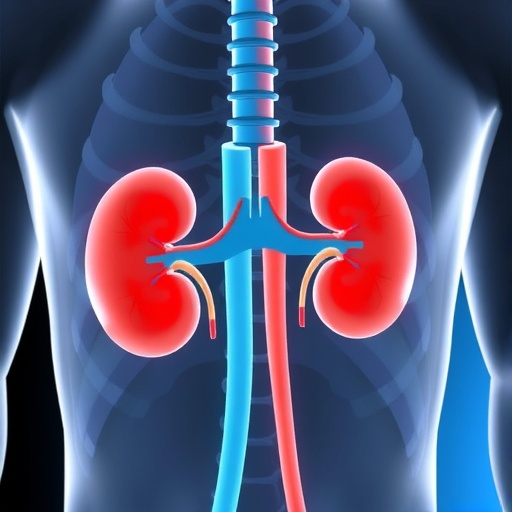In the evolving landscape of diabetes management, the quest to define the relationship between various glucotypes and their implications for patients with type 2 diabetes and concomitant kidney disease has taken a significant leap forward. Recent research conducted by Chou, Liu, and Lin, slated for publication in 2025 in the journal BMC Endocrine Disorders, sheds light on this complex interaction. This pivotal study delves into the nuances of glucotypes and highlights how different anti-diabetic treatments can profoundly impact the health outcomes of individuals suffering from both diabetic kidney disease (DKD) and end-stage kidney disease (ESKD).
Understanding glucotypes—subtypes of glucose metabolism patterns—within the context of type 2 diabetes is crucial for tailoring effective treatment strategies. Each glucotype reflects unique metabolic responses to glucose, influenced by a range of factors including diet, medication, and overall health status. For patients with DKD or ESKD, these responses can represent the difference between managing their condition effectively and facing significant health complications.
The foundational aspect of this research is grounded in the acknowledgment of the stark realities faced by diabetic patients with renal impairments. DKD alters the pharmacokinetics of many anti-diabetic medications, leading to variable efficacy and increased risks of adverse effects. This is particularly true for insulin and other glucose-lowering agents. The study provides comprehensive insights into how these alterations necessitate individualized treatment plans, underscoring the importance of personalized medicine in managing chronic conditions such as diabetes.
The methodology employed in this research included a robust cohort of patients, specifically selected for their diagnosis of type 2 diabetes in tandem with either DKD or ESKD. By examining their glucotypes through extensive metabolic profiling and utilizing advanced biostatistical methods, the researchers aimed to identify patterns that could inform better clinical practices. Such rigorous analytical approaches not only enhance the reliability of their findings but also pave the way for future studies to build upon these foundations.
As the study progresses, it reveals that the impact of glucotypes extends beyond mere management of blood glucose levels. The researchers observed that certain glucotypes were associated with different rates of progression in kidney function, indicating that glucose metabolism is intricately linked with renal health. This correlation signifies an urgent need for healthcare providers to consider glucotype profiles when devising treatment regimens for their diabetic patients, especially those at the higher risk of kidney complications.
Furthermore, the study highlights the role of anti-diabetic treatments in modulating glucotypes. Various classes of medications, such as metformin, sulfonylureas, and newer agents like SGLT2 inhibitors, have diverse mechanisms of action and distinctly affect glucose metabolism. By categorizing patient responses to these treatments based on their glucotypes, the research indicates that some diabetic patients may benefit from specific anti-diabetic agents that align with their metabolic profiles, enhancing both efficacy and safety.
In addition to the clinical implications, the study raises pertinent questions about healthcare policies and diabetes management protocols. As we advance toward an era that emphasizes precision medicine, it becomes imperative for clinical guidelines to evolve and incorporate findings such as these into practice. With diabetic kidney disease being a leading cause of morbidity and mortality in diabetic patients, the integration of glucotype analysis into routine diabetes care could lead to significantly improved health outcomes.
Results from this research will likely resonate throughout the scientific community and amongst healthcare professionals dedicated to diabetes care. Not only does it underline the complexity of managing diabetes in patients with kidney disease, but it also emphasizes a fundamentally different approach that prioritizes an understanding of individual patient profiles. Such insights invite a reexamination of the traditional paradigms that have long governed diabetes management strategies.
Moreover, the findings could spark further research initiatives aimed at exploring additional factors influencing glucotypes, including genetic predispositions and lifestyle choices. The intricate interplay between genetic variants, nutrient absorption, and lifestyle factors such as diet and exercise is likely to yield even richer insights into the pathophysiology of type 2 diabetes in future studies.
Ultimately, the implications of this work extend far beyond the confines of a single study. As the world grapples with the diabetes epidemic—where millions are affected and countless lives altered—the need for innovative strategies that enhance patient care has never been clearer. This research serves as a critical reminder that the approach to diabetes and kidney disease must be as multifaceted as the diseases themselves.
In conclusion, Chou, Liu, and Lin’s research will undoubtedly be a landmark in the field, contributing substantially to our understanding of glucotypes in managing type 2 diabetes amidst the challenges posed by diabetic kidney disease and end-stage kidney disease. It reinforces the necessity for a tailored treatment approach that not only considers blood glucose levels but also encompasses a patient’s unique metabolic landscape.
Armed with these insights, healthcare professionals can strive toward more effective and personalized diabetes management, potentially transforming the lives of millions worldwide facing the dual challenges of diabetes and kidney disease.
Subject of Research: The impact of glucotypes on type 2 diabetes management in patients with diabetic kidney disease and end-stage kidney disease.
Article Title: Glucotypes in patients with type 2 diabetes and either diabetic kidney disease or end-stage kidney disease under different anti-diabetic treatments.
Article References:
Chou, YY., Liu, FH. & Lin, CH. Glucotypes in patients with type 2 diabetes and either diabetic kidney disease or end stage kidney disease under different anti-diabetic treatments.
BMC Endocr Disord (2025). https://doi.org/10.1186/s12902-025-02108-7
Image Credits: AI Generated
DOI: 10.1186/s12902-025-02108-7
Keywords: glucotypes, type 2 diabetes, diabetic kidney disease, end-stage kidney disease, anti-diabetic treatments, personalized medicine, metabolic profiling.




